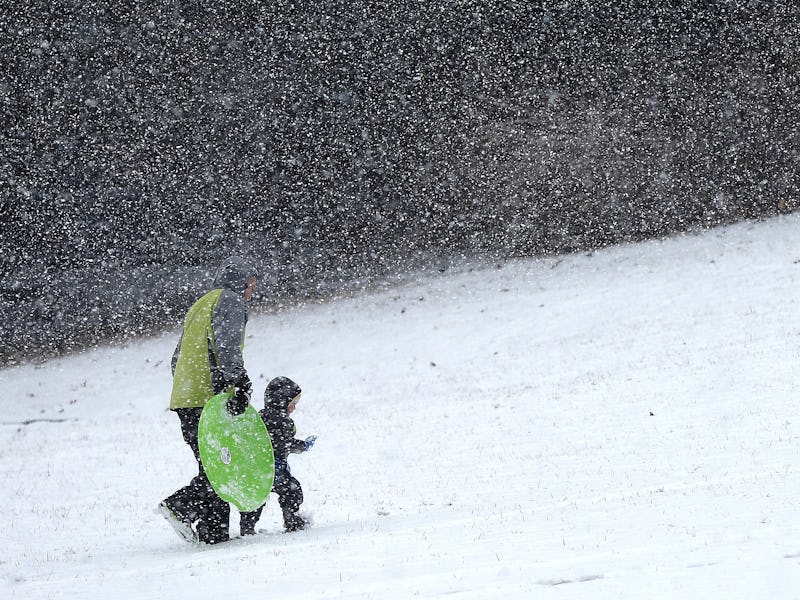Adults Need Snow Days, Too
Schools regularly get closed. With the internet a thing, why don't offices?

Today in Denver, Colorado — where I’m typing this — there’s about a foot of snow outside my front door. Currently, 9 News — one of our local TV news stations — has a list of 568 closings in the area, and that number is going up. As you might guess, it’s mostly schools and government closings (in addition to more than 300 cancelled flights). Some businesses are shuttered — my buddy who works for the Red Cross tells me it is, almost ironically, not open because of the weather — but most are not. How can that be? Driving in these conditions is unsafe and, goddamnit, the internet is a thing which exists.
I worked at Regis Jesuit — where I went to high school — for a couple of years as alumni director. The school is infamous around town as being liberal with snow day closings. (It’s closed today.) It’s mostly for the students, of course, many of whom drive 45 minutes or more from places as far afield as Boulder and Colorado Springs. I once asked my former principal about what determined a snow day and he told me that, in the ‘90s, there was a bad student wreck on campus, and a student had to be helicoptered to the hospital. Since then, Regis Jesuit has leaned toward late starts and snow days. As should the country at large.
A snow day when you’re an adult is almost like winning the lottery. It’s amazing — far better than when we were kids. But, still, even when Regis Jesuit closed, I had to — ya know — answer my emails and such. The ease of this is what fuels my fundamental beef with the office-or-bust status quo. Most working professionals have phones and internet connections at home. Surely most of us can drive better than when we were 16, but how much better? When the roads are as treacherous as they are today, why would anyone be expected to leave their home?
My buddy, John, has a pretty easy drive to work — about 10 minutes from just south of downtown into the belly of the beast. He wrote an email to a list we are on today, unprompted, “Fuck that drive. Got stuck trying to park for 30 minutes. These weather forecasters really suck ass. Plus my pants got dirty and I just dry cleaned them.” As the Federal Highway Administration reports, stained pants are the least of our worries. “On average, there are over 5,760,000 vehicle crashes each year,” the Administration writes. “Approximately 22 percent of these crashes – nearly 1,259,000 – are weather-related.” That’s an insane statistic. And snow and ice account for half of that, about 11 percent of all crashes. You’d have to believe that, if we got smarter about allowing for telecommuting, that figure would drop significantly.
Our generation fundamentally doesn’t understand this conundrum. Knowledge workers, so-called, don’t have to go into work to be productive. In fact, I’ve had many days where I’ve been more productive outside of an office environment. One Stanford study found that workers at a call center made 13.5 percent more calls from home than the staff in the office did. There’s a larger debate about working from home and the savings companies reap by turning the proverbial lights off. And we can shelve that, for the moment. There’s an old-school approach to busting your ass to show up early and often versus a globalized, connected new wave. But, let’s just take the days when flakes of crystalline water ice fall from the sky: Let the workers stay home.
If you want to go one step further, there’s something to be said about just straight-up granting workers a random day off. Just like when we were in school, an unexpected day of leisure can rejuvenate and energize — especially if you’re not drinking whiskey all day. Americans average only 16 days of paid leave per year — far less than, say, Australia with four weeks off plus 10 public holidays or France with at least five weeks off — and we’re the only advanced nation without a national vacation policy. We could all use a snow day. Even in Florida.